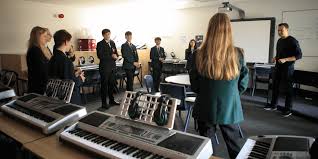Inspiring Generosity for Music Programs: The Ultimate Guide to Music Education Fundraising
Key Takeaways
- Identifying unique fundraising opportunities can significantly impact music education programs.
- Collaborative events, such as concerts, amplify community involvement.
- Digital tools expand fundraising potential by reaching broader audiences.
Introduction: Why Fundraising Matters for Music Education
Music education provides essential developmental benefits, enhancing students’ creative thinking and improving cognitive skills. Yet, many music programs need more funding to access resources and access. With increased pressure on school budgets, exploring innovative fundraiser music strategies to sustain these vital programs becomes crucial. Effective fundraising bridges financial gaps and involves the community in nurturing future musical talents. By using creative techniques, schools and organizations may guarantee that music education continues to be a dynamic and approachable aspect of student life.
Successful fundraising offers more than financial support—it invigorates community spirit and demonstrates a collective commitment to the arts. Such endeavors can be transformative, turning financial obstacles into opportunities for growth and enrichment through diverse and creative events. Let’s delve into imaginative fundraising ideas that have the potential to embark on this impactful journey.
Innovative Ideas for Music Education Fundraisers
- Host an Open Mic Night: Organizing an open mic night gives aspiring musicians a stage to display their skills, encouraging innovation and teamwork. These events attract performers and audience members alike and emphasize community involvement. Participants of all ages can enjoy a night of diverse performances while simultaneously supporting a crucial cause.
- Organize a Community Talent Show: A community talent show offers an engaging way to unite residents, allowing them to proudly present their varied skills. Talent shows ignite passion, excite audiences, and illustrate the importance of fostering youthful creativity. The proceeds from ticket sales and sponsorships contribute significantly to music programs, ensuring continued access to instrumental lessons and choir practices.
- Plan Virtual Benefit Concerts: Virtual benefit concerts have gained popularity as adaptable fundraiser formats. By leveraging technology, schools and organizations can reach expansive audiences beyond geographical boundaries. Schools can collaborate with musicians to showcase diverse performances while raising awareness and funds online. This innovative approach allows supporters worldwide to enjoy quality entertainment and contribute to the cause.
- Launch a Crowdfunding Campaign: Crowdfunding platforms revolutionize how communities can financially contribute to meaningful causes. Platforms like Kickstarter and Indiegogo allow people near and far to actively support their favorite initiatives. Organizations can engage a wider audience and solicit the funds needed to enrich music programs by telling compelling stories and sharing students’ musical journeys.
Collaborative Events: Partnering with Local Artists
Partnering with local artists for fundraising events adds a layer of community engagement while enhancing event attractiveness. Artists can bring unique styles and fan bases, drawing in larger crowds and increasing reach. These collaborations foster a community initiative model where schools and artists benefit symbiotically. Schools gain exposure to the artists’ followers, while artists enjoy wider recognition and community appreciation. Additionally, artist-led workshops, where they share their craft, can provide educational experiences that align with fundraising goals.
Utilizing Digital Platforms for Fundraising Success
Digital platforms revolutionize the scope of fundraising, unlocking new opportunities and reach. Funders can use online crowdfunding sites like GoFundMe or Kickstarter to reach audiences across different regions, ensuring broader participation. These platforms allow for personalized campaign pages, where compelling narratives and engaging visuals enhance the appeal to potential donors. The convenience and ease of online donations also encourage continued support, which is crucial for maintaining steady funding over time.
Promoting Your Fundraiser Through Social Media
In the digital age, social media networks are becoming vital resources for fundraising campaign promotion. With their wide user bases and enormous reach, platforms like Facebook, Instagram, and Twitter provide creative and captivating methods to promote engagement from a wider audience and increase awareness of significant topics. Organizations should focus on creating compelling and shareable content to harness the power of these platforms. This can include visually striking graphics, informative infographics, and heartfelt videos that resonate with potential donors. These materials can inspire action and emotional connections with the cause by clearly conveying the fundraiser’s mission and goals.
Additionally, strategic social media tactics that prioritize storytelling can significantly enhance engagement. Sharing personal stories from beneficiaries or testimonials from past donors can help illustrate the impact of contributions. Regular interaction with followers through comments, shares, and live updates fosters a sense of community and belonging, which can galvanize support for the fundraiser. Overall, a well-executed social media strategy that combines creative content, engaging storytelling, and consistent interaction can effectively energize current supporters while attracting new participants to the fundraising effort.
Engaging the Community: The Heartbeat of Successful Fundraising
Involving the community is essential to any fundraising effort’s success. Fundraising efforts gain authenticity and commitment by enlisting local businesses, schools, and community leaders. Volunteering opportunities create a sense of ownership and cultivate advocates who can champion the cause within their local network. Additionally, outreach programs and community-centric activities can further amplify awareness, ensuring sustained interest and support for music education.
Evaluating the Impact: Measuring Success and Areas for Improvement
Post-event assessment is an invaluable step in understanding the true impact of fundraising initiatives. By analyzing financial outcomes and gathering participant feedback, organizations can gauge their successes and highlight areas that need refinement. This evaluation process enables informed decision-making for future fundraising efforts. By celebrating success and identifying improvement opportunities, fundraisers can iterate on strategies to ensure continuous progress in supporting music education.
Conclusion: Creating Lasting Change Through Music Education Support
The essence of fundraising extends beyond mere monetary achievements and fosters community, creativity, and sustainable educational opportunities. As fundraisers adopt innovative strategies and engage community support, they contribute to a culture where music education thrives. By nurturing this collective effort, students can enjoy rich musical experiences that inspire and transform their educational journeys. Together, communities can make a profound and lasting impact, ensuring music’s vibrant presence in education for generations.
Stay in touch to get more news & updates on Aoomaal!



